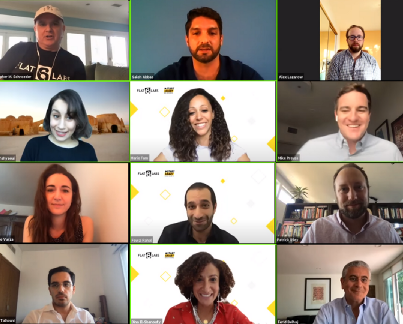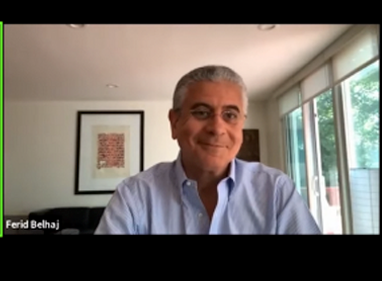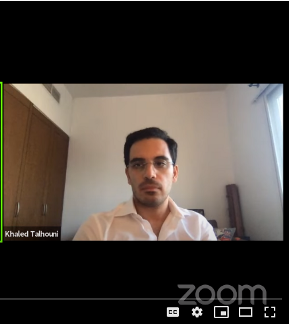Month: June 2020
Flat6Labs Cairo Graduates Eight Startups At Its Spring 2020 Digital Demo Day
Flat6Labs Cairo, the leading Startup Accelerator in Egypt, helds its Spring 2020 Demo Day with eight new startups graduating from its first cycle of fiscal year 2020.
Flat6Labs Cairo’s Spring 2020 cycle commenced on February 16th in 2020 and welcomed eight promising new teams, filtered from around 1000 applications, who are now excited to launch their businesses to the general public. This cycle has entrepreneurs coming from all across Egypt and the startups are working across various industries, from Fintech, E-commerce, Logistics, and SaaS, to Artificial Intelligence, on-demand car services, Freelance Marketplace, and Bio materials, offering innovative technological solutions set to disrupt the market.
The eight innovative startups presented their projects online in front of thousands of viewers including local and regional investors, mentors, reputable technology experts, top entrepreneurs, and influencers from the region, and press, who are keen on witnessing the progress of the start-ups and the latest innovations in the region.
“We’re extremely happy to be graduating this latest batch of 8 startups, and cannot wait to see how they’ll continue to scale their businesses to a new level post Demo Day”. — Ramez El-Serafy, CEO of Flat6Labs“Our startups have been extremely resilient through a cycle that overlapped with COVID-19. They have developed and adapted their solutions to the pandemic. Personally, I am extremely proud of them.” — Marie-Therese Fam, Managing Partner of Flat6Labs Cairo
In 2017, Flat6Labs Cairo partnered with four anchor investors; the International Finance Corporation, MSME Development Agency, Egyptian American Enterprise Fund, and Egypt Ventures, as limited partners, to launch a new phase of the Flat6Labs Cairo Accelerator Program. Flat6Labs Accelerator Company (FAC) aims to fund 100+ innovative startups across Egypt, with a focus on tech-enabled solutions, during its five years of investment period. Since the launch of the FAC fund, Flat6Labs Cairo has received over 4,500 applications, trained more than 450 founders, ran 6 cycles, and invested in 52 startups.
Flat6Labs Cairo fosters and invests in bright and passionate Egyptian entrepreneurs with cutting-edge ideas, and supports them by providing access to a vast network of local and international investors, industry experts, partners and corporations. Every six months, Flat6Labs Cairo provides seed capital to eight to ten new startups, each company receives from EGP 500K to EGP 750K in funding for up to 10% equity. Flat6Labs Cairo has so far trained and funded 106 startups — including “legacy” startups that have graduated from the program since its launch in 2011.
The eight graduating startups that showcased their technologies and business ideas at Flat6Labs Cairo Spring 2020 Demo Day include:
- 3atlana : a mobile application that offers car services on the go and connects users to trusted service providers.
- Bosla : a voice analytics software that analyses human behavior.
- CreditGo : a payment aggregator for Small Businesses.
- Inploy : an online marketplace that connects businesses to premium freelance talent & SME’s.
- Mycelium : transforming agriculture waste into new material that replaces plastic and synthetic wood.
- Opio : a digital Women’s fashion brand.
- Tayar : Fleet Management SaaS powered by AI to automate and optimize home delivery operations for businesses.
- Wedel : an on demand shipping and delivery hailing mobile application.
Check out the Demo Day and our startups here
8 Best Tips From Our 8 StartSmart Webinars
Over the past few months, countries and regions have witnessed a global lockdown. While we were forced to stay home, we’ve decided to host eight webinars that would help the startup ecosystem and its key players take part in rebuilding it. This was done mainly through regional and global interviews with renowned investors & entrepreneurs, who have shed light on unique aspects of the COVID-19 pandemic and its regional & global impact on startups. We’ve decided to share them with you in a bite-sized article, with the eight best tips from our 8 #StartSmart Webinars.
“The pandemic heightens the need for inclusive services & products.” — Christopher Schroeder, a Global Investor
As we’ve all seen, this pandemic and the move to online communication, transactions, consultation, etc… has deepened the need for our economies to be inclusive of those who don’t have access to such technologies. Entrepreneurs should cease this opportunity to create solutions that bring inclusivity to a new level, Chris said.
Read more about our 1st Webinar here: “How to Take Off Your Startup During COVID-19 Outbreak”
“Startups In the Frontier Ecosystems Need to Think Globally.” — Alexandre (Alex) Lazarow, a global investor and author of “Out-Innovate.”
Alex elaborated that startups in growing economies need to think of how their startup can expand globally or regionally when they are just starting out. It is important to create a solution that could be adapted to different cultures and economies because it will facilitate your growth. He highlighted that most of today’s unicorns had going global at their core from the very beginning. Entrepreneurs need to think about how you can build teams that communicate efficiently across the world, and how they can build that global muscle from day one. Also, the pandemic is enabling entrepreneurs to reach out to global investors without the need to travel. This is a chance for them to raise money and approach remote investors.
Read more about our 2nd Webinar here: “How To Out-Innovate.”
“You don’t need to be in silicon valley to do something great.” — Amira Yahyaoui, MOS’ Founder
An entrepreneur should first and foremost be building for the experience, the journey, and changing people’s lives. Entrepreneurs need to realise that wherever they are in the world, there are problems that require innovative solutions, which will ultimately change people’s lives, hence, “you don’t need to be in silicon valley to do something great,” Amira said. She added” “the only interesting thing about silicon valley is the technology and the people,” and if you can read books, watch webinars, and listen to podcasts coming from the silicon valley, you can start anywhere.
Read more about our 3rd Webinar here: “Building a startup in Silicon Valley”
“Send consistent updates.” — Mike Preuss, Co-founder & CEO of Visible.vc
Mike said that in one of their surveys, they have discovered that founders are more likely to get investments if they are consistent with their reports to investors, in fact it increases their chances by %300. During the COVID-19, investors will likely be looking at startups that have a record of maintaining their reports. Most founders can’t raise because they don’t update investors regularly.
Read more about our 4th Webinar here: “Impactful Communication with Investors During COVID-19”
“If you want to see long term, positive change, you need to commit yourself to positive change.” — Roxanne Varza, Director of Station F
While the pandemic has held most of us hostage in our homes, it has provided an opportunity for the environment to get better. If we want it to keep getting better, we need to find solutions to do that, while still living our normal lives. COVID-19, on the good side of things, has provided us with a lot of opportunities that need to be explored by our aspiring entrepreneurs.
Read more about our 5th Webinar here: “Opportunities and Lessons Learned”
“Ask your customers/clients what they are doing, not what they need.” — Patrick Riley, CEO of the Global Accelerators Network (GAN)
Lots of businesses of varying sizes have changed their business models overnight to cope with pandemic, and all of them are dealing with new challenges. If you can ask them what they are doing, know the services they are offering, you can most definitely know & assume their challenges/problems, and develop/adapt your offerings to help them. Patrick added, “Your solution must always be relevant.” You can research different segments and find your “sweet spot,” and start developing a prototype or even launch a startup that is revolutionary, but no one wants because it is not relevant. When you start a research to create a product/service, think of how long it can stay relevant to people and businesses.
Read more about our 6th Webinar here: “Seed-stage Startups: A Global View”
“Find the right balance between human clustering and individual functions.” — Khaled Talhouni, Managing Partner of Nuwa Capital
Some tasks will require human clustering to be finished effectively, like creating a new innovative product/service. However, there will be tasks that require individual efforts, which could be done more productively from home. Startups need to find that balance between taking their jobs home, and clustering to innovate. Khaled Talhouni, Managing Partner of Nuwa Capital
Read more about our 7th Webinar here: “Building In the New Normal”
“Young entrepreneurs who have ideas should move ahead & do them.” — Ferid Belhaj, Vice President of World Bank MENA
Young entrepreneurs in MENA need to have the ambition to go way beyond what they think is possible because new tech must spread everywhere, Ferid said. He also noted that the market will judge the entrepreneurs’ projects, and whether it can absorb their products or not. Entrepreneurs need to do what they feel will work, and see for themselves if it actually solves the problem.
Read more about our 8th Webinar here: “The World Is A Village: World Bank Response to Covid-19”
The good thing about all these tips is that they are effective during the pandemic, post-pandemic, and in the face of any other economic recession. Make sure to utilise them to the best of your ability, and perhaps share it with your friends?
StartSmart 8th Webinar Recap: The World Is A Village: World Bank Response to Covid-19
On our eighth and last Flat6Labs StartSmart Webinar, we hosted Ferid Belhaj, Vice President of World Bank MENA, interviewed by Dina el-Shenoufy, Flat6Labs’ CIO to discuss World Bank’s response to COVID-19 globally and specifically in MENA. Ferid offered us his unique perspectives on how to tackle #COVID19, and how to create more opportunities for MENA startups. This is our full recap of the webinar.
“The world is a village”
Ferid said, one needs to find the right balance between squeezing out the best of the village that the world is becoming, and some of the possible negative aspects of this.
“Globalisation is fundamental”
Globalisation has helped us stay connected & work twice as much as we used to work from offices, and we need to push the globalisation of technology if a similar crisis ever comes to be, Ferid added.
“The World Bank has committed $160bn to MENA”
Since the crisis started, the World Bank committed $160bn to fast track financing facilities to help countries around the world to manage and deal with the health dimension of the crisis; to help the backbone of economies: SMEs; and to offer social protection for vulnerable people due to COVID-19.
“Young entrepreneurs who have ideas should move ahead & do them”
Young entrepreneurs in MENA need to have the ambition to go way beyond what they think is possible because new tech must spread everywhere, Ferid said. He also noted that the market will judge the entrepreneurs’ projects, and whether it can absorb their products or not. Entrepreneurs need to do what they feel will work, and see for themselves if it actually solves the problem.
“States in MENA need to be an enabler for startups”
“MENA needs to take care of itself,” Feird said. While we are trying to help countries, entrepreneurs and vulnerable families, states need to be the enabler that pushes everyone to do their best. States need to push out reforms that help startups. In some of Ferid’s talks with government officials from around MENA, they said that they are starting to recognise that they should have invested more in innovative solutions.
“Investment in new tech is never ever a lost investment”
Investors who have the resources and ability to invest in new technologies, need to be aware that it is their responsibility to help startups who are suffering because of the pandemic. They also need to be aware that an investment is never a lost investment, something will always come out of it; be it a new solution or a pivoted business model, something can always happen that can transform the way we live.
Make sure to join our upcoming Flat6Labs Cairo Spring 2020 Demo Day, June 24th. For more information and to register, click here.
StartSmart 7th Webinar Recap: Building In the New Normal
Our seventh Flat6Labs StartSmart Webinar was co-hosted by Khaled Talhouni from Nuwa Capital, with our own CEO, Ramez El-Serafy, to discuss the changing definition and implications of building companies and what this means for the MENA region
“Human clustering is a big part of accelerated innovation” — Khaled
Historically, Khaled said, that there has been a large dependence on human clustering to achieve innovation. It, as he said, plays a significant role as one of the economic engines. There is something about the existence of a people in a dense environment that cannot be replicated virtually.
“Find the right balance between human clustering and individual functions” — Khaled
Some tasks will require human clustering to be finished effectively, like creating a new innovative product/service. However, there will be tasks that require individual efforts, which could be done more productively from home. Startups need to find that balance between taking their jobs home, and clustering to innovate.
“Our region is super resilient” — Ramez
Over the past decade, we’ve seen and learnt how startups have been capable of surviving the many crises, Ramez said. Our applications during 2011 & 2012, have actually doubled every cycle, and that is a great indication of how crisis can breed innovative solutions, great adaptability, and resilience.
“Startups need to ask themselves what is different” — Ramez
During these times, startups will be either thinking about pivoting quickly to stay relevant, pushing forward with their existing solutions, or shutting down to cut the losses. Startups need to think about whether there is an actual opportunity to pivot, by changing their business model, creating partnerships, etc… They also need to think about how they can utilise their current solution to temporarily benefit from the situation. The crisis will end one day, so you as a startup founder, need to to think about your solutions and their viability in both the long and short term.
“There is going to be a shift in private capital” — Khaled
Businessmen will be looking for ways to invest their money in more transparent ecosystems, and they will head for micro investors and micro fund managers to take off the hassle of due diligence off of themselves. AngelList is the first iteration of that.
Make sure to join our upcoming Webinar on June 9th, 2020, Co-hosted by Ferid Belhaj of The World Bank MENA and our own Chief Investment Officer, Dina el-Shenoufy.
For more information and to register, click here.





